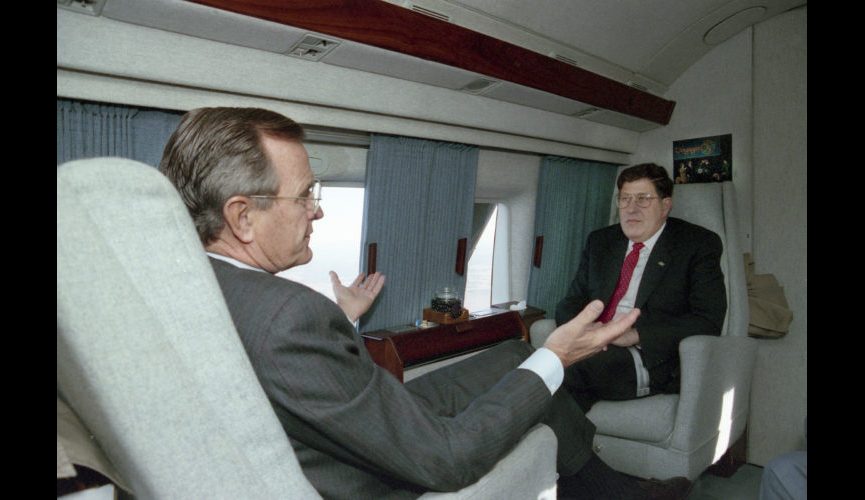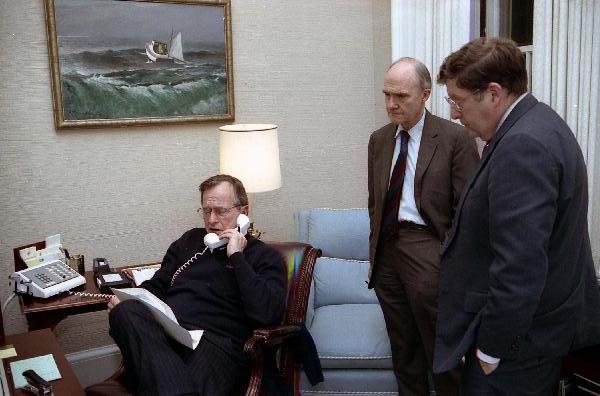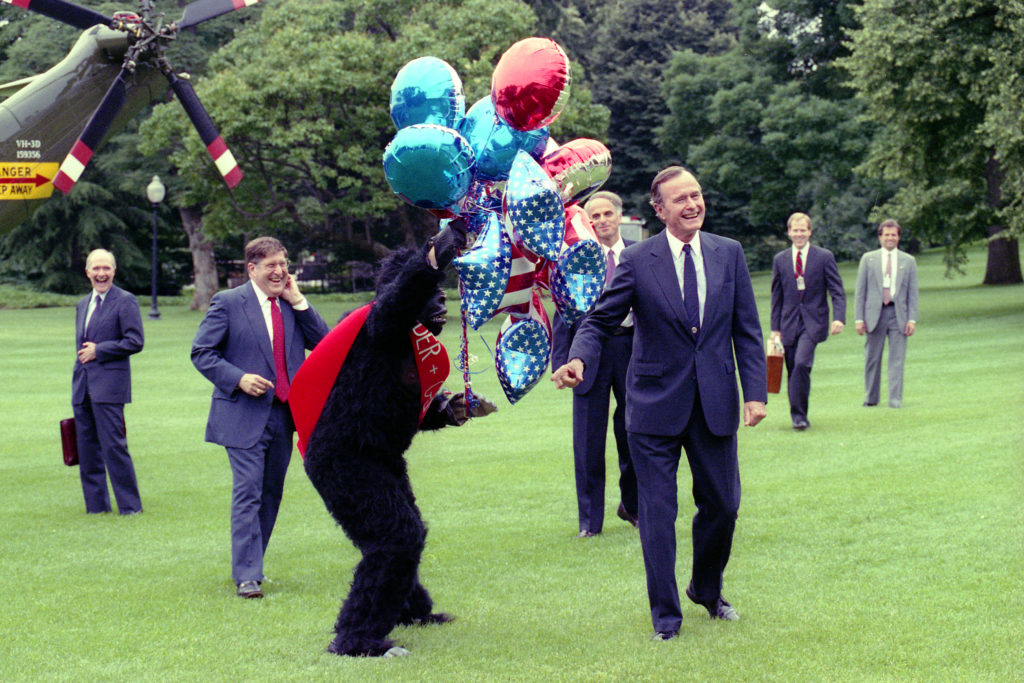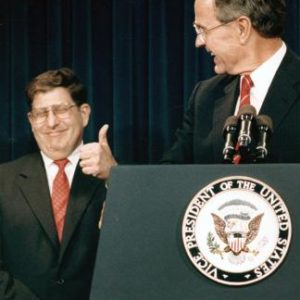The day after President George H. W. Bush’s funeral at the National Cathedral, his one-time Chief of Staff John H. Sununu sat down with InsideSources to talk about his experiences with Bush 41, and in particular his relationship with New Hampshire.

President Bush flies on Marine II with Chief of Staff John Sununu
NHJOURNAL: Gov. Sununu, what’s your favorite story about campaigning in New Hampshire with President Bush?
SUNUNU: I think the most interesting thing that happened with President George Herbert Walker Bush was when he came out of Iowa into New Hampshire in 1988. He’d come in third out there, and we decided we had to do everything to remind people of why they liked him before Iowa. And he basically said “John, you tell me what to do and we’ll go do it. “
So we had him going to five breakfast places a day– with a press that wondered if we were crazy or not. And he would go to a Dunkin Donuts or McDonald’s or the local diner, and he would walk around and shake everybody’s hand and talk to them while they were eating. We went over to the Seacoast and put him in a 12-wheeler, and he drove around in that.
Then we teamed up with Ted Williams. Ted Williams was a Marine pilot and George Bush was a Navy pilot, and I don’t think they had really ever met before. But Sam Tamposi, a developer up here, was a good friend of Ted’s and when he got Ted and the President together, they bonded immediately. Just seeing the chemistry between these two guys who had flown combat missions for the country, and the special bond that came from that, was pretty amazing.
So we took Williams and Bush north to Wolfeboro, and we did it in the teeth of a raging snowstorm. And once again, the press thought we were crazy. But when we get to the high school, there are 3,500 people packing the place. And frankly, I thought that was one of the most leveraged political acts that we had in the ’88 campaign.
The President won the state by about 10 points but we did even better in the North Country. And that was because of his willingness to go up there and campaign with Ted Williams. Their instant bonding is something I’ll always remember. And I’ll remember that the things the press may think are stupid often turn out to be good ideas.
[NOTE: Bush beat Sen. Bob Dole in New Hampshire 37.7 to 28.5 percent. Bush’s two best counties were Coos and Carroll, both in the North Country]
NHJOURNAL: What’s your most ‘New Hampshire’ memory of President Bush?
The other significant memory of him came when I had just won the primary for governor in September of 1982. As you know, we have September primaries up here. After I won the nomination, I picked up the phone and called the sitting vice president, introduced myself to him and said, ‘Mr. Vice President, I’m running against the incumbent Democrat up here, I need a fundraiser. Would you come up?’ And 11 days later, he was here. Wow.
We raised, I don’t remember the number, maybe three hundred, four hundred thousand dollars, which in those days was a lot of money for a campaign in New Hampshire, and I won that election. But my memory is the easy nature of that conversation. In politics, those kinds of conversations can be awkward, but all of a sudden here was a guy who was willing to help out an almost stranger who was making a rather significant request of a sitting vice president.
NHJOURNAL: In the past few days, George H. W. Bush has been described as a Texas oil man and a proper New England WASP. Which one was he?
SUNUNU: Well, he was both. The gentle way he treated people was something he learned from his mother, who was a good New Englander. And from his father. They were both New Englanders and had a reserved style about them. I remember the line from his mother “Don’t be a braggadocio.” That was obviously old New England.
Then he goes to Texas and learns to be sort of a wildcatter, to take chances. In a way, his political career was a series of wildcat steps, and he began to expand his personality. You know, sometimes we in New England are a little bit insular, In Texas, it’s big, wide-open country out there. I think he got a better sense of all of America as he developed the Texas side of his personality.

President Bush, with Sununu and National Security Advisor Brent Scowcroft
NHJOURNAL: Still, it’s safe to say that President Bush came from the tradition of New England Republicanism. You were a Republican governor in a New England state. What does “New England Republican” mean to you?
SUNUNU: I would trace New England Republicanism back to its Boston roots, for example to Calvin Coolidge–a true conservative and in almost every sense of the word, except for tariffs. Coolidge, and the Lodges–these were Republicans who understood the emerging role of the US as a principal country, as a major player in the world.
I’ll tell you another one–and this may sound like heresy– but Franklin Roosevelt, the great Democrat, he had the New England/Northeast Republican sensibility on the international side. He recognized the need for US to take a stand against Nazi Germany. I think FDR’s sense of America’s role as an emerging principal power was pure New England/Northeast Republicanism.
NHJOURNAL: What was one of George H. W. Bush’s best days as president? One he really enjoyed?
George Bush was a great baseball fan. One of the great days we had was bringing Joe DiMaggio and Ted Williams to the White House for the 50th anniversary of the summer of DiMaggio’s 56-game hitting streak and Ted Williams batting .400. Both of those happened in 1941. He gave them each a presidential medal, and then we stuck them on Air Force One and flew them to Toronto for the All-Star game. And that meant we had Joe DiMaggio and Ted Williams to ourselves for an hour and a half. Listening to them talk baseball? Wow.

President Bush is accosted by a gorilla (played by OMB Director Richard Darman) on his 65th birthday.
NHJOURNAL: What was George H. W. Bush’s favorite joke?
SUNUNU: President Bush loved jokes. But like [Senator] Alan Simpson said at his funeral, he was a terrible joke teller. He could never remember the punchlines.
But he loved doing funny things. There was one time, we were at some NATO meeting, or maybe it was an OEDC meeting– some meeting with all the European countries and the US and Canada. And all the presidents and prime ministers were making their speeches, and a lot of folks there didn’t stay for all the speeches. Most people slipped out at some point.
Not President Bush. He stays through this whole thing, which may have lasted like six hours. And every once in awhile he would pull out a piece of note paper and, with a very serious face, write a note and hand it to me. I would take the note and look at it as though it was a serious matter of state, something I needed to communicate to [Secretary of State] Baker or someone. And I still have all those notes today. Why?
Because they all turned out to be limericks he had made up–some might say adult-themed limericks–about each of the speakers!
NHJOURNAL: What was it like to work for George H. W. Bush, the man? Do you have an example?
SUNUNU: I served as his chief of staff for three years. At one point it became clear to me I should probably step down. I was hoping the ‘lightning’ would follow me away from the White House, but unfortunately they kept throwing it at him.
When I did step down, George H. W. Bush wrote three very long, beautiful letters: One to my wife and kids, one to me, and one to my father and mother. That was typical of the kind of things that he did. He knew there would be disappointment in the family when I stepped down, and the way he handled it was really the mark of the man.

